At Mustard Seed Communities, oversight, accountability, and transparency in our policies are integral to our operations. Our collaboration with the Child Protection and Family Services Agency (CPFSA) of Jamaica, the country’s child protection governing agency under the Ministry of Education, Youth and Information, ensures that each resident receives comprehensive and consistent care. CPFSA works in conjunction with the Jamaican government’s Office of Child Advocacy and the Jamaica Constabulary Force to provide holistic support.
This collaboration, along with our rigorous internal protocols, demonstrates our unwavering commitment to providing a safe, nurturing environment for the most vulnerable. Here’s a closer look at the measures we take to uphold these principles.
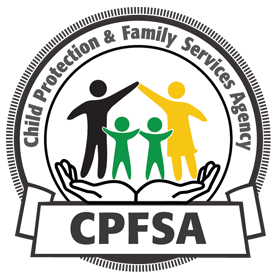
Child Protection and Family Services Agency Oversight and Accountability
The Child Protection and Family Services Agency (CPFSA) of Jamaica plays a vital role in the care and development of residents at Mustard Seed Communities (MSC). Our collaboration with CPFSA ensures that each child receives comprehensive and consistent care. Here’s how we involve CPFSA:
How do you involve the CPFSA in the care and development of the residents?
- Regular Communication and Reporting:
- Ongoing Updates: MSC maintains regular communication with CPFSA, providing updates on each resident’s progress, health status, and any incidents that may occur. This includes sharing detailed reports and assessments.
- Incident Reporting: Any significant events, such as medical emergencies or behavioral incidents, are promptly reported to CPFSA. This ensures that CPFSA is always informed and can provide additional support or intervention if necessary.
- Development and Implementation of Care Plans:
- Initial Assessments: Upon admission, each resident undergoes a comprehensive assessment by MSC staff and certified doctors. The findings are shared with CPFSA to develop a personalized care plan.
- Collaborative Planning: CPFSA collaborates with MSC to create and implement these individualized care plans. This includes setting developmental goals and determining the best strategies to meet each resident’s needs.
- Regular Inspections and Reviews:
- Regular Visits: CPFSA representatives conduct regular visits to MSC facilities to inspect the living conditions, review care practices, and ensure compliance with regulations. These inspections help maintain high standards of care.
- Performance Reviews: During their visits, CPFSA also reviews the performance of MSC caregivers and staff, ensuring that they are adhering to established protocols and providing the best possible care.
- Medical and Nutritional Oversight:
- Health Monitoring: CPFSA collaborates with MSC’s medical team to monitor the health and nutritional status of the residents. They participate in regular health check-ups and reviews of medical records.
- Nutritional Support: CPFSA provides guidance and oversight on the nutritional plans for malnourished residents. They review feeding charts and dietary plans to ensure residents are receiving adequate nutrition.
- Training and Capacity Building:
- Staff Training: CPFSA supports MSC in training caregivers and staff. This includes providing resources for professional development and ensuring that staff members are equipped with the necessary skills and knowledge to care for residents effectively. Additionally, all staff members at Mustard Seed Communities undergo thorough background checks every year. This regular vetting process is required by the Child Protection and Family Services Agency (CPFSA), our governing body, and is crucial for maintaining a safe and secure environment, ensuring that everyone who works with us is qualified and trustworthy.
- Workshops and Seminars: CPFSA organizes workshops and seminars for MSC staff, focusing on best practices in child care, disability support, and crisis management.
- Feedback and Continuous Improvement:
- Stakeholder Meetings: MSC and CPFSA hold regular meetings with other stakeholders, including health professionals, social workers, and community members, to discuss the residents’ care and development. These meetings provide a platform for feedback and continuous improvement.
- Response to Concerns: CPFSA helps address any concerns or complaints raised by the community or stakeholders. They work with MSC to investigate issues and implement corrective actions to improve care standards.
“The Child Protection and Family Services Agency has never received any allegations of abuse against any of the children at the Mustard Seed facilities. In relation to the Haitian children, we have been monitoring the home and we have conducted investigations. We have not seen any instances of maltreatment of the children by the Mustard Seed caregivers or management.” ]
– Laurette Adams-Thomas, Head of CPFSA.
Listen to the full interview with Laurette Adams-Thomas, Head of CPFSA here.
MSC’s partnership with CPFSA is critical in ensuring the highest standard of care for the residents. CPFSA’s involvement ranges from developing individualized care plans and conducting regular inspections to providing training for staff and monitoring the health and nutrition of the residents. This comprehensive collaboration reflects MSC’s commitment to transparency, accountability, and continuous improvement in caring for the most vulnerable.
General Operations and Protocols
What is the daily routine for residents at Jacob’s Ladder?
Watch this video for a sense of what a typical day for a resident at Jacob’s Ladder may look like.
Residents at Jacob’s Ladder enjoy a structured, safe, and enriching schedule such as this sample daily routine:
- 5:30 AM: Wake up.
- Morning Hygiene Care: Caregivers assist with washing faces, brushing teeth, showers, diapers, and dressing for the day. High-functioning residents manage these activities themselves.
- Cleanup: Caregivers clean cottages, make beds, tidy bathrooms, mop floors.
- 7:45 AM: Day shift arrives; each cottage has a caregiver. Night shift gives incoming caregivers updates on the night, including any incidents. Supervisors ensure all residents are accounted for and sign off on reports.
- 8:15 AM: Residents gather in the common room for handover and devotions.
- Breakfast: Served in the dining area, prepared by cleaners, cooks, and laundry staff who start at 7 AM. Residents and caregivers clean up after meals.
- Outdoor Time: Residents spend time outside, weather permitting.
- 10:00 AM: Circle time for 30 minutes, including educational activities like weather identification; day of the week; singing; etc.
- 10:30 AM: Work and token program begins; residents are assigned to different departments (laundry, kitchen, maintenance, office, IT) from Monday to Friday and receive stipends.
- 12:00 PM: Midday devotion and lunch.
- Afternoon: Activities include Careplus programs (tabletop activities, coloring, painting, beading, storytime, exercise, physical therapy).
- 4:45 PM: Handover to night shift.
- Evening: Activities with mission teams, concert nights.
- 6:30 PM: Supper in the village.
- 7:00 PM: Devotions.
- 8:00 PM: Back to cottages for hygiene care and bedtime.
What are the specific protocols in place for ensuring the cleanliness of the facilities?
- Cleaning Staff: 10 cleaners on staff, assigned to various areas (villages, administration, chapel, mission cottage).
- Daily Tasks: Cleaners arrive at 7 AM to prepare common areas (mopping, sweeping, sanitizing tables). Two are assigned to each village throughout the day, cleaning toilets, windows, floors, and walls with disinfectant.
- Public Health Oversight: The Ministry of Health Public Health ensures adherence to cleaning procedures every three months (every three days when the Haitian children arrived to ensure their living arrangements were safe).
- Certified Staff: All MSC staff have safe food handler permits and are certified in proper hygiene and food safety practices.
- Garbage Removal: Refuse is placed in a large receptacle outside of the resident villages several times throughout the day. The large garbage receptacle is removed from the property three times a week on Monday, Wednesday, and Friday.
What is the training and qualifications required for caregivers and staff members?
- Training: All caregivers complete a six-month to two-year practical nurse course at a recognized institution. Training includes basic first aid, vital signs monitoring, and wound dressing.
- Specialized Training: All caregivers receive Allied Health training specific to assisting individuals with disabilities, covering the entire curriculum before certification.
How do you monitor and evaluate the performance and adherence to protocols by staff members?
- Performance Monitoring: Mustard Seed Communities administrators and supervisors monitor staff performance through regular evaluations, ongoing training, and refreshers on established protocols.
Meals, Hydration, and Individualized Nutrition Plans
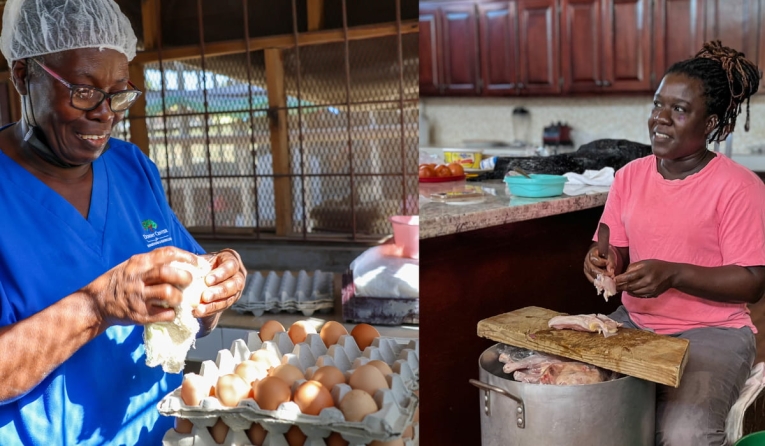
What is the process for planning and preparing meals for the residents?
- Meal Planning: Based on nutritional needs and health conditions, meals are planned and prepared to ensure balanced and nutritious diets for each resident. Every MSC staff member must pass the Food Safe training certification.
How do you ensure that the residents receive balanced and nutritious meals?
- Scheduled Meals and Snacks: We ensure that all residents receive three nutritious meals a day, plus two snacks to keep them energized and healthy. Meals are delivered directly to each village and served in the common rooms, fostering a sense of community. For lunch and dinner, residents typically enjoy a variety of dishes including chicken, peas, rice, pork, and vegetables, accompanied by a drink.
Are there any specific dietary plans for residents with particular health conditions?
- Individual Plans: Specific feeding plans are created, and residents may receive additional meals, shakes, and snacks as per their requirements.
How are the residents provided with enough fluids to keep them sufficiently hydrated?
- Hydration Stations and Scheduled Water Breaks: There is a labeled hydration station with an Igloo cooler that is refilled daily. Assigned staff members monitor these stations to ensure the coolers remain full. We also schedule water breaks every hour to ensure residents are receiving enough water throughout the day. Likewise, nonverbal and/or non-mobile residents are given water hourly by the caregivers on duty. We often add a Gatorade to give the water some color: this not only makes the water more appealing but also provides extra electrolytes for added hydration.
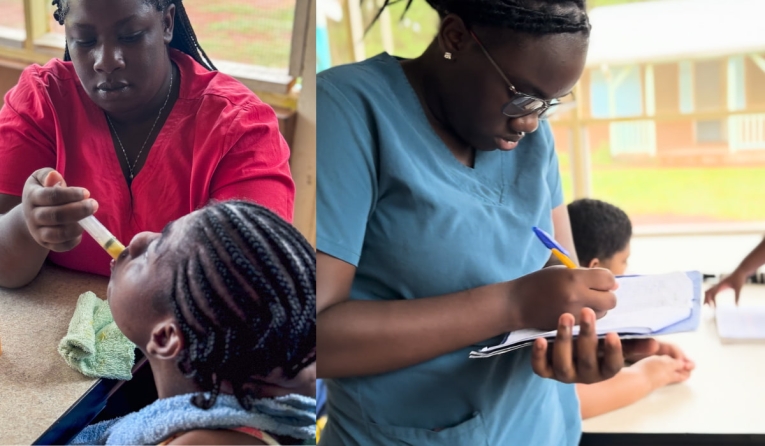
How do you monitor and evaluate the health progress of each resident in relation to their nutrition?
Residents diagnosed as malnourished are identified by medical supervisors based on their weight and overall health. When a resident is not thriving, a comprehensive plan is put in place to address their nutritional needs.
- Nutrition Clinic: A nutrition clinic at Moneague Health Center is conducted weekly. Residents identified with malnutrition by the doctor are transported to this clinic for specialized care and monitoring.
- Regular Follow-ups: Each resident identified as malnourished is taken to the clinic every two weeks for follow-ups. These visits help track their progress and make any necessary adjustments to their dietary plan.
- Customized Meal Plans: Individualized meal plans are created for each resident based on their specific needs. These plans may include additional meals and shakes made with oats, bananas, and peanut butter to increase caloric intake.
What steps are taken to treat malnourished residents?
- Feeding Plans: Residents with severe malnutrition have feeding plans that provide separate meals fed every two hours. These plans ensure they receive adequate nutrition throughout the day.
- Feeding Charts: Caregivers maintain detailed feeding charts for these residents, logging the quantity and type of food consumed at each meal. This information is crucial for tracking their nutritional intake.
- Regular Updates to Doctors: The feeding charts are reviewed regularly by doctors at Moneague Health Center and updated to ensure accuracy. The logged information is shared with doctors during follow-ups, allowing them to monitor progress and adjust dietary recommendations as needed.
- Nutritional Adjustments: Based on the progress and doctors’ recommendations, dietary plans may be adjusted to increase fiber, protein, or include more fruits like apples and mangoes to ensure a balanced and nutritious diet.
Where and how is food stored safely?
- Facilities: Kitchen facilities are equipped for safe food preparation and storage, adhering to health and safety standards.
Medical Care and Health
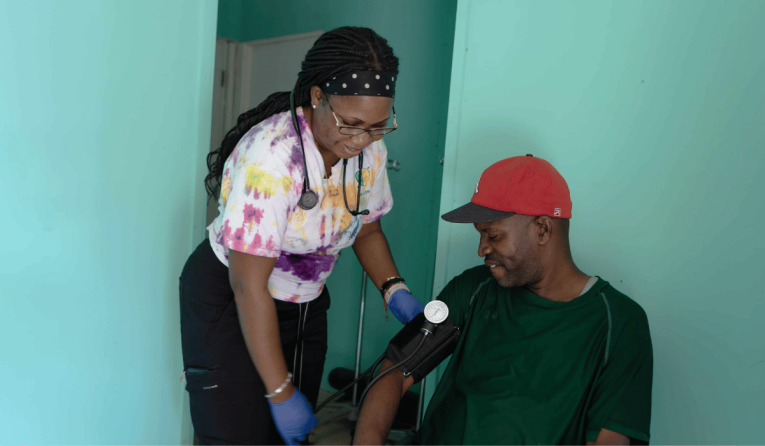
What are the procedures for handling medical emergencies?
- Immediate Response: The person who witnesses the emergency first takes action to ensure the medical emergency is addressed according to proper protocols. The supervisor is then alerted and the incident is documented.
- Medical Supervision: If the emergency persists, the supervisor contacts the office to call the ambulance or hospital.
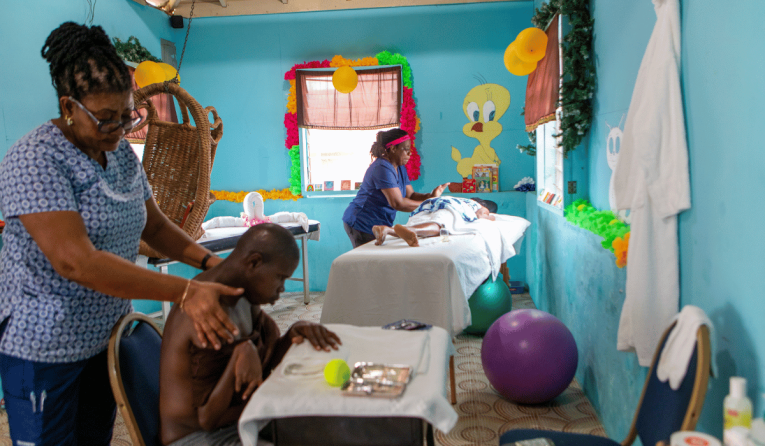
How often do residents see healthcare professionals?
- Regular Checkups: All residents receive two medical checkups from qualified doctors per year according to CPFSA guidelines, with additional visits to specialists as needed. Many residents receive more frequent visits from doctors due to their health conditions. MSC strictly adheres to the guidance of medical professionals as to the frequency of medical visits each individual may require. In some cases, certain individuals see a doctor as frequently as once per week.
- Mental Health Support: A Ministry of Health psychiatrist visits twice a month and conducts assessments and interventions with residents who were prescribed psychiatric care as part of their individual plan.
- Physical Therapy: Mustard Seed Communities ensures our residents get regular physical therapy. We employ qualified therapists who work individually with residents on motor skills, muscle tone, eating habits, and a variety of other modalities.
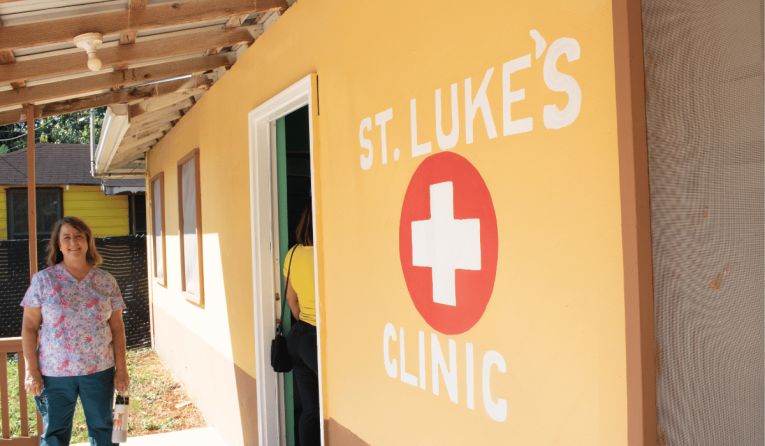
What medical facilities are available on-site?
- Clinic: Jacob’s Ladder has an on-site medical clinic, staffed by a senior nurse. The senior nurse manages medical supplies, conducts assessments, and provides treatment. First aid kits are also available in all villages.
How often do medical professionals visit the home, and what services do they provide?
- Regular Visits: MSC strictly adheres to the CPFSA’s requirements that each resident see a medical doctor twice a year. In some cases, a resident may see a doctor more frequently based on their health needs. Doctors and mental health professionals visit regularly for assessments and treatments.
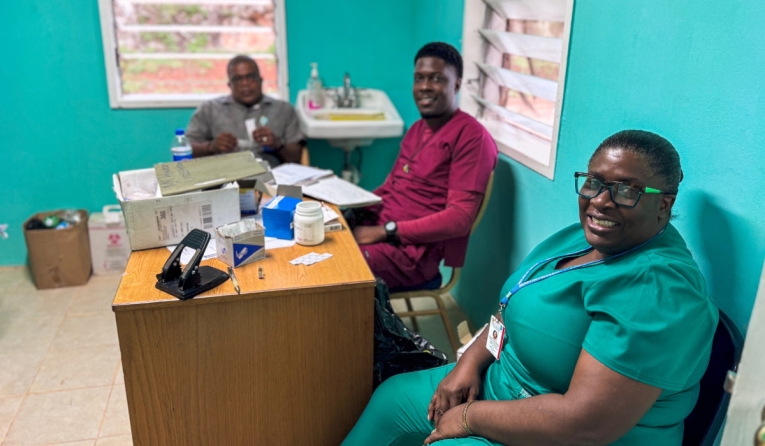
How does MSC partner with local hospitals or medical providers?
- Collaborations: MSC partners with qualified doctors. We arrange for visits from pediatricians, physicians, and various specialists to visit the residents on campus. Additionally, MSC holds on-site vaccination clinics. When care is not accessible on campus, MSC arranges transportation to an outside facility, clinic, or hospital for regular checkups, dental care, surgeries, urgent care, and emergencies.
What is the process for managing and administering medications to the residents?
- Medication Management: Medications are prescribed by doctors, picked up by MSC from the pharmacy in Ocho Rios, recorded, stored safely in the Health Clinic and administered by supervisors.
How do you maintain records of the residents’ health, nutrition, and overall well-being?
- Record-Keeping: Each resident has detailed medical and history files maintained by senior supervisors and medical staff. The resident files are easily accessible to authorized individuals. Archives of medical files are diligently stored on-site.
Safety and Security
What measures are in place to ensure the physical safety of the residents?
- Restricted Access to Cleaning Chemicals: All cleaning supplies and chemicals are stored in secured areas that are locked and only accessible to authorized personnel.
- Proper Labeling: Each chemical container is clearly labeled with safety instructions and potential hazards to ensure that staff handle them correctly.
How do you handle incidents that may pose a risk to the residents’ safety?
- Incident Reporting: Incidents are reported to supervisors, documented, and escalated to the appropriate authorities. Each incident is thoroughly documented and reviewed to determine ways to improve care for the residents.
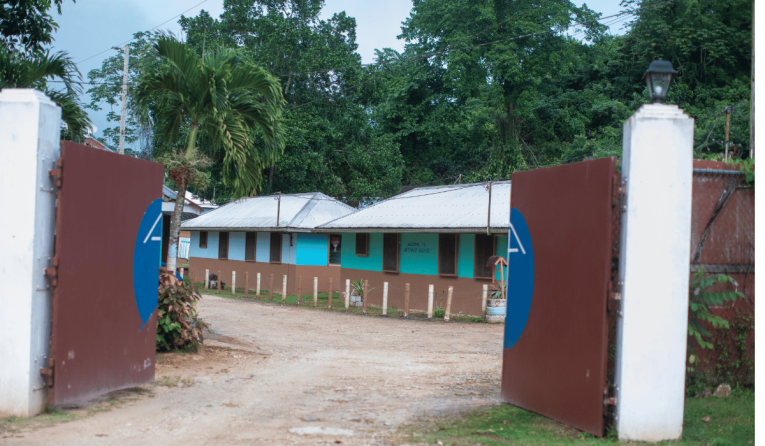
Are there any security personnel on-site, and what is their role?
- Security Staff: Two to three security officers are present day and night, ensuring the safety of residents and property. The property is gated with an officer monitoring access to the campus 24 hours a day, seven days a week.
How do you ensure that the residents are supervised at all times?
- Supervision: Caregivers are assigned to cottages with a ratio of one caregiver to five residents. The whereabouts of each resident is meticulously logged and tracked throughout the day.
Growth Mindset: Recent Improvements in Care and Environment
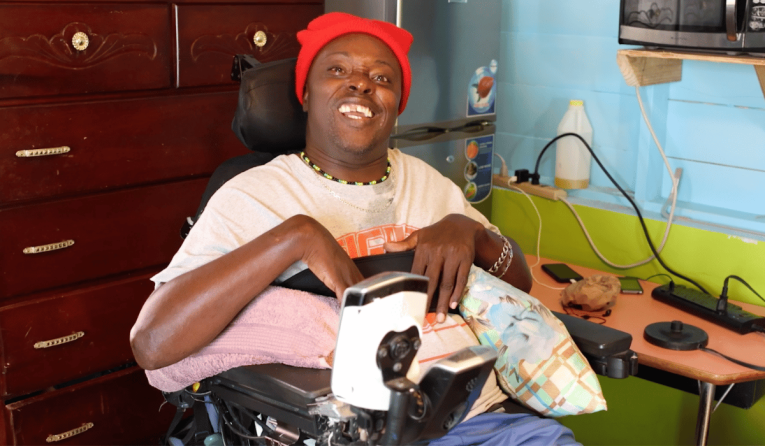
What recent improvements have been made to enhance the care and environment at Jacob’s Ladder?
- Semi-Independent Living Cottages: We retrofitted several cottages for semi-independent living for adults with disabilities at Jacob’s Ladder. Each cottage was remodeled to include single bedrooms so that residents can experience autonomy within a supportive community setting.
- Hiring Staff to Ensure CPFSA Compliance: In 2023, MSC hired an assistant manager for the Caring Resource Department. Responsibilities of this role include conducting annual audits of all MSC homes in Jamaica and providing recommendations for improvement to ensure compliance with CPFSA guidelines. Additionally, the assistant manager adapts training courses for caregivers to refresh their skills and implement best practices.
- Hiring 22 Additional Caregivers: We hired 22 additional caregivers to address the needs of residents, including the residents from Haiti. Each caregiver at Jacob’s Ladder meets qualifications to provide excellent health and wellness services. All caregivers complete a six-month to two-year practical nurse course, covering first aid, vital signs monitoring, and wound dressing, and receive Allied Health training specific to assisting individuals with disabilities.
- Landscaping at Ephesus: In June, we received a commitment from the Digicel Foundation to finish the landscaping at Ephesus Village. We expect that to be completed in July.